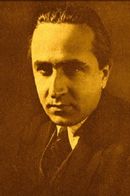Lev Vladimirovich Kuleshov, a renowned Russian and Soviet filmmaker and film theorist, was one of the founders of the world's first film school, the Moscow Film School. He was honored with the title of People's Artist of the RSFSR in 1969.
Born in 1899, Kuleshov's early life was marked by financial struggles, as his family lost their estate and moved to Tambov, where they lived a modest life. After his father's death in 1911, Kuleshov and his mother moved to Moscow, where his elder brother was studying and working as an engineer. Although Kuleshov initially followed his father's footsteps and enrolled in the Moscow School of Painting, he didn't complete his studies.
In 1916, Kuleshov applied to work at the film company led by Aleksandr Khanzhonkov, where he produced scenery for several pictures. However, he soon became more interested in film theory, co-directing his first film, Twilight, in 1917. His next film was released under Soviet patronage.
During the Russian Civil War, Kuleshov covered the conflict with a documentary crew from 1918 to 1920. In 1919, he headed the first Soviet film courses at the National Film School. Kuleshov is often credited as the pioneer of Soviet montage theory, developing his theories of editing before those of Sergei Eisenstein, who was briefly his student.
Kuleshov believed that the essence of cinema lay in editing, the juxtaposition of one shot with another. To illustrate this principle, he created the Kuleshov Effect, a famous editing exercise that demonstrated how editing can alter viewers' interpretations of images. In this exercise, shots of an actor were intercut with various meaningful images, such as a casket, a bowl of soup, and so on.
In addition to his theoretical and teaching work, Kuleshov directed a number of feature-length films. Some of his most notable works include the action-comedy The Extraordinary Adventures of Mr. West in the Land of the Bolsheviks (1924),the psychological drama By the Law (1926),adapted from a Jack London short story, and the biographical drama The Great Consoler (1933),based on O. Henry's life and works.
After directing his last film in 1943, Kuleshov served as an artistic director and academic rector at VGIK, where he worked for the next 25 years. He passed away in Moscow in 1970 and was buried at the Novodevichy Cemetery. Kuleshov was survived by his wife, Aleksandra Khokhlova, an actress, film director, and educator, and her son from a previous marriage.














